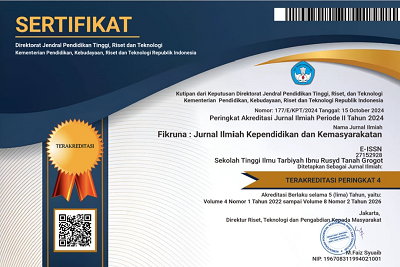DEKONSTRUKSI TEORI USES AND GRATIFICATIONS DALAM ERA POST-TRUTH ANALISIS KRITIS TERHADAP KESADARAN PALSU PENGGUNA MEDIA SOSIAL DALAM PEMENUHAN KEPUASAN INFORMASI
Abstract
This research aims to deconstruct the theory of Uses and Gratifications in the context of the post-truth era, with an emphasis on a critical analysis of the misperception among social media users in meeting the needs of information. The post-truth era is characterized by the dominance of emotions and personal views that trump objective facts, which in turn affects the way individuals consume and process information. The conventional Uses and Gratifications theory views media users as active and rational individuals in choosing media to meet specific needs, such as entertainment, information, or social interaction. However, in the context of post-truth, this paradigm needs to be revisited. The study shows that social media users are often trapped in false consciousness due to social media algorithms and confirmation bias. The algorithm encourages the consumption of content that is in line with the user's personal beliefs, thus reinforcing the view without providing an opportunity for fact-verification. In addition, the phenomenon of echo chambers and filter bubbles further strengthens the isolation of information, which contributes to the formation of distorted reality. The approach used in this study is qualitative with critical analysis of relevant literature and case studies of social media users. The results of the analysis show that the information satisfaction felt by users is often illusory and does not reflect the fulfillment of real information needs. This false awareness creates the illusion of information fulfillment, even though the information consumed tends to be biased and incomplete. The conclusion of this study is that in the post-truth era, the theory of Uses and Gratifications needs to be reconstructed by considering the factors that affect false consciousness and information distortion. It is important for social media users to improve their media literacy and be critical of the sources of information they consume, in order to avoid the trap of false awareness and achieve more accurate and meaningful information fulfillment.
References
Allcott, Hunt, and Matthew Gentzkow, �Social Media and Fake News in the 2016 Election�, Journal of Economic Perspectives, 31.2 (2017), 211�36
Body, D., It � s Complicated?: The Social Lives of Networked Teens It � s Complicated (London: Yale University Press, 2014)
Christians, Clifford G, Mark Fackler, Kathy Brittain Richardson, and Peggy J Kreshel, Media Ethics; Cases and Moral Reasoning; Eleventh Edition (New York: Routledge Taylor & Francis Group, 2020)
Claire, Wardle, and Derakhshan Hossein, �Information Disorder: Toward an Interdisciplinary Framework for Research and Policy Making / Reports / Publications / Media Freedom in Europe - Resource Centre by OBCT - Resource Centre�, Information Disorder: Toward an Interdisciplinary Framework for Research and Policy Making, 2017, 20�25
Creswell, John W., Research Design (Los Angeles: Sage, 2009)
DAVID KARPF, Analytic Activism DIGITAL LISTENING AND THE NEW POLITICAL STRATEGY (London: Oxford University Press, 2016)
Denis McQuail, McQuail�s Mass Communication Theory (London: Sage, 2010)
Dolan, Rebecca, Jodie Conduit, John Fahy, and Steve Goodman, �Social Media Engagement Behaviour: A Uses and Gratifications Perspective�, Journal of Strategic Marketing, 24.3�4 (2016), 261�77
Ellison, Nicole B., Charles Steinfield, and Cliff Lampe, �The Benefits of Facebook �Friends:� Social Capital and College Students� Use of Online Social Network Sites�, Journal of Computer-Mediated Communication, 12.4 (2007), 1143�68
Farkas, Johan, and Jannick Schou, �Post-Truth, Fake News and Democracy: Mapping the Politics of Falsehood�, Post-Truth, Fake News and Democracy: Mapping the Politics of Falsehood, February, 2019, 1�166
Fuchs, Christian, Communication and Capitalism: A Critical Theory, European Journal of Communication (London: University of Westminster Press, 2021), XXXVI
Hameleers, Michael, and Toni G.L.A. van der Meer, �Misinformation and Polarization in a High-Choice Media Environment: How Effective Are Political Fact-Checkers?�, Communication Research, 47.2 (2020), 227�50
Katz, Elihu, Jay G Blumler, and Michael Gurevitch, �Reception Studies or Audience Studies: Uses and Gratifications Research�, The Public Opinion Quarterly, 1973, 509�23
Kim, Junghyun, and Jong Eun Roselyn Lee, �The Facebook Paths to Happiness: Effects of the Number of Facebook Friends and Self-Presentation on Subjective Well-Being�, Cyberpsychology, Behavior, and Social Networking, 14.6 (2011), 359�64
Lazer, David M.J., Matthew A. Baum, Yochai Benkler, Adam J. Berinsky, Kelly M. Greenhill, Filippo Menczer, and others, �The Science of Fake News: Addressing Fake News Requires a Multidisciplinary Effort�, Science, 359.6380 (2018), 1094�96
LEAVY, PATRICIA, Research Design Quantitative, Qualitative, Mixed Methods, Arts-Based, and Community-Based Participatory Research Approaches, Sustainability (Switzerland) (New York and London: The Guilford Press, 2017), XI
Littlejohn, Stephen, W., Karen A.Foss, and John G. Oetzel, THEORIES OF HUMAN COMMUNICATION Eleventh Edition, Waveland Press, Inc., 2017, LIII
Luhmann, Niklas, SOCIAL SYSTEMS, Journal GEEJ (CALIFORNIA: STANFORD UNIVERSITY PRESS, 1995), VII
Matthew B. Milees, A. Michael Huberman, Johnny Saldana, Qualitative Data Analysis A Methods Sourcebook, Sustainability (Switzerland) (London and New York: Sage Publications, 2014), XI
Mouwn Erland, Metodologi Penelitian Kualitatif. In Metodologi Penelitian Kualitatif, Rake Sarasin, 2020
Packman, Carl, �Book Review: The Filter Bubble: What the Internet Is Hiding from You�, British Politics and Policy at LSE, 2011, 294
Pennycook, Gordon, Adam Bear, Evan T. Collins, and David G. Rand, �The Implied Truth Effect: Attaching Warnings to a Subset of Fake News Headlines Increases Perceived Accuracy of Headlines without Warnings�, Management Science, 66.11 (2020), 4944�57
Quan-Haase, Anabel, and Alyson L. Young, �Uses and Gratifications of Social Media: A Comparison of Facebook and Instant Messaging�, Bulletin of Science, Technology & Society, 30.5 (2010), 350�61
Rubin, Alan M., �Television Uses and Gratifications: The Interactions of Viewing Patterns and Motivations�, Journal of Broadcasting, 27.1 (1983), 37�51
Siregar, Alya Rahmayani, Azrai Harahap, and Mahardhika Sastra Nasution, �Etika Komunikasi Media Digital Di Era Post-Truth�, Jurnal Paradigma: Jurnal Multidisipliner Mahasiswa Pascasarjana Indonesia, 5.1 (2024), 39�53
Sundar, S. Shyam, and Anthony M. Limperos, �Uses and Grats 2.0: New Gratifications for New Media�, Journal of Broadcasting and Electronic Media, 57.4 (2013), 504�25
Sunstein, Review Cass R, Conspiracy Theories, and Other Dangerous, �Cass R . Sunstein . Conspiracy Theories And�, Spontaneous Generations: A Journal for the History and Philosophy of Science, 8.1 (2016), 100�104
Tandoc, Edson C., Zheng Wei Lim, and Richard Ling, �Defining �Fake News�: A Typology of Scholarly Definitions�, Digital Journalism, 6.2 (2018), 137�53
Tinto, V, �Chicago: University of Chicago Press�, American Journal of Sociology, 2nd ed.6 (1976), 1546�48
Vosoughi, Soroush, Deb Roy, and Sinan Aral, �The Spread of True and False News Online. Science, 359(6380), 1146�1151 | 10.1126/Science.Aap9559�, RESEARCH SOCIAL SCIENCE, 1151.March (2018), 1146�51
Weber, Max, The Protestant Ethic and the Spirit of Capitalism, The Routledge International Handbook on Max Weber (London and New York: Routledge, 2022)
Copyright (c) 2025 Imaida Noor Hasibuan, Mailin Mailin, Rubino Rubino

This work is licensed under a Creative Commons Attribution-NonCommercial 4.0 International License.



.png)












